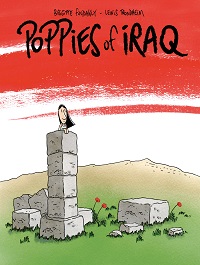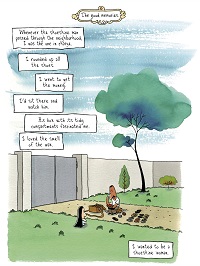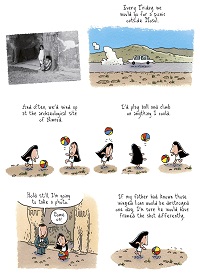| ________________
CM . . . . Volume XXIV Number 6. . . . October 13, 2017
excerpt:
Mosul – you’ve heard the name of that city many times in news reports. It is a Daesh (a.k.a. ISIS) stronghold, but back in 1950, it was the home of Brigitte Findakly’s parents. Her father was an Iraqi citizen studying dentistry in Paris, France, where he met Brigitte’s mother on the platform of the Ste. Lazare railroad station. Iraq is a country where most matches were (and continue to be) arranged, and the marriage wasn’t exactly well-received by his family. Theirs was a venerable family, one able to trace ancestral roots back to 300 CE, but despite generations of Orthodox Christian heritage, they lived peacefully with their Muslim neighbors.
Throughout Brigitte’s childhood, Iraqi politics were in a state of constant turmoil, although she had little awareness of the danger around her. From 1963 onward, the family spent every summer in France, and she recalls that, despite “the turbulence and the coups of the 1960s, I only felt in danger once”, and that was during the Paris student uprisings in May of 1968. “We found ourselves in the street. All the cafes were closing . . . And then we heard the roar of a wave of protestors coming toward us. We followed the other people seeking safety in a subway station. . . I told myself France was dangerous.” Over time, everyday life in Iraq was increasingly fraught with tension. Personal interaction became difficult; when friends, relatives and neighbours met socially, political discussions were avoided, and so gossip became “the national pastime in Iraq . . . In conversation, people would avoid saying anything deep or intimate out of fear it might get repeated or even distorted.” And over time, a real rift opened between Christians and Muslims, and Christians began to feel fearful of their safety. Dr. Findakly would return home at 5:00 pm in order to avoid being out in public at night. Foods, such as butter, eggs, fruits and vegetables, became scarce, and in 1970, the Ba’ath Party introduced a program of “people’s work campaigns” which required high school and university students to spend their summers working on farms or in construction work in rural areas. Brigitte’s father was wary of the program, and so, in 1970, at the age of 16, her brother Dominique was enrolled in a private school in France. More government edicts affected the family: a 1971 law required that civil servants and military who had married abroad either had to obtain a divorce or resign. Dr. Findakly resigned from the military, working full-time at his private practice. Punitive taxation (he treated many patients for nothing, but was still assessed on a per capita basis), denial of the right to leave Iraq in order to join his family on their annual summer holiday in France, and increasing strictures of all types, led to his decision that the family would move to France, planning to return to Iraq when things improved. But over time, the Iraqi political situation worsened: “with Sadat Hussein becoming president in 1979, the Iran-Iraq war from 1980 to ’89, the Gulf War in 1990, the economic sanctions that followed, the second Gulf War in 2003, and now Daesh.” Mme Findakly was unhappy with the decision, and, although there were aspects of Iraqi life and culture that she had never integrated, she wasn’t keen to return to France. Their return to France was as difficult as Brigitte’s mother anticipated. Despite his having enrolled in a specialized program in dental implantation, Dr. Findakly’s qualifications weren’t recognized because they had been obtained 25 years earlier. Like many immigrant professionals, he was under-employed, and Mme Findakly had to find work, as well. School was a challenge for Brigitte, too. Although she spoke excellent French, she had never really learned to read it or write it, and that skill deficit made every class a nightmare. As is the case with so many immigrant kids, her potential was grossly under-estimated, and at the end of grade nine, the school’s guidance counselor suggested she switch to a vocational program. Nevertheless, she did go to university, and on the first day of classes, found herself sitting next to someone who had been at the top of her grade nine class. “I felt very proud to be there, next to her, in spite of the guidance counselor’s opinion.” She was studying economics, but she took a dance class and her teacher happened to be married to a comics artist. Brigitte had always enjoyed drawing, and her dance teacher’s husband introduced her to the field of colouring in graphic art. She immersed herself in the work, exhibited promise and talent, and, as a result, quit university to devote herself full-time to art. Three years later, after assuring her parents that she was earning a living from her art, she moved into her own studio. Over the years, she returned occasionally to Iraq for visits with family, but increasingly, Brigitte found herself alienated from the country that was once her home. On her first visit, she nearly faints from the summer heat, and her observations of the political climate, the dress code (shoulders and knees had to be covered up), cultural expectations (her aunt received numerous marriage proposals on her behalf) made her disinclined ever to want to live there again. A subsequent visit, after the end of Iran-Iraq war in 1989, is a turning point for Brigitte. One of the cousins of whom she was quite fond, Nabil, served as a doctor at the front during that war and was gravely injured. When she does get to visit with Nabil, she is shocked at his premature aging, his physical disfigurement as a result of his war-time injuries, and his overall fragility. Other changes had taken place amongst other cousins: men wore traditional dress at home, everyone had huge freezers which were re-filled when stores restocked after the frequent food shortages, women kept shoulders and knees covered, and home repairs went untended because of shortages of building materials. And everyone was very, very careful about voicing any comment that might be interpreted as criticism of the Saddam Hussein regime. “Of course, we had all grown older, but more than anything, my relatives seemed worn out and tired . . .” Brigitte decided to extend her stay for another two weeks, but although happy to spend time with her many cousins, she is keenly aware that the quality of their lives had deteriorated on many levels. The end of the Iran-Iraq war gave hope that she might return for more frequent visits. Nevertheless, after the 1990 invasion of Kuwait and the start of the Gulf War, she never returned to Iraq. Although life in France had offered many challenges for Brigitte and her brother, they knew that they were fortunate not to be living in Iraq. Her father was not so convinced. Then, following a series of Iraqi government policy decisions affecting Iraqi citizens living abroad, Dr. Findakly quit his job at the Iraqi embassy in Paris where he had finally found work in 1975. He did not wish to reimburse the Iraqi government for the small military pension he had been receiving, nor did he want to join the Ba’ath party, as was required for embassy employees. At home, he became depressed and regretful at his decision to leave Iraq, claiming that “It was all a mistake. I could have had a wonderful life in Iraq.” Only after a 1995 trip to his homeland did Dr. Findakly see just how stressful life had become for his family and so much of Iraq’s populace. There was no more nostalgia, nor regret, and he never complained again. While Brigitte never returned to Iraq in 2006, she and her brother travelled to Amman, Jordan, for a family wedding. “The wedding couldn’t be held in Baghdad because . . . a number of churches had been targeted by bomb attacks. It had been seventeen years since I’d last seen them. And thirty-six years for my brother. We all cried. For a long time.” Life had become almost intolerable, and by 2016, her cousins had all left Iraq since their only hope for providing their children with a semblance of normal life was to emigrate. Despite her instruction in the Catholic faith and her public school study of the Quran, Brigitte had never become a believer in either, or any, religion. But her cousins, for the most part, “clung to the one thing they could take with them: their Christian faith. And all have become Islamophobic.” To her credit, she does not judge their attitude, stating that “ I’ll continue to love them as they are, as people I care about.” The final page of the book is the last of single-page panels recounting “The Good Memories” of her childhood in Iraq. It shows a wash of a deep orange sky, the result of one of the sandstorms which would hit Mosul. School would be closed, traffic ground to a halt, and everyone was inside. She “loved those moments when we all had to stay home together.” Poppies of Iraq is a powerful story on so many levels. The book is a joint effort by Findakly and her husband, Lewis Trondheim, an acclaimed cartoonist; they live in the south of France, and across the street from them, live her now very aged parents. Poppies is a memoir of Brigitte’s childhood, but it is hardly idealized or sentimental. This is a story that has been lived by countless immigrants from war-torn or politically unstable regions: people leave their homeland in hopes of a more secure life for their children and themselves, only to find themselves in a state of emotional and cultural exile, and living a life of unexpected economic hardship. Former professionals find themselves working at menial jobs, and the comfortable lifestyle they enjoyed in their homeland is gone forever. Their hope is that their children will prosper. Throughout the book, Findakly includes one- or two-page panels titled “In Iraq”, offering insights into cultural norms which North American or European readers might find strange. And her experiences in the educational systems of both Iraq and France show that no school system is without its faults. Memory is rarely linear, and the story sometimes shifts back and forth from past to the present and back to the past as current political events are counterpointed with those of the past. Poppies in Iraq depicts the slow and subtle erosion of civil liberties which occurred in Iraq, along with the increasing distrust that arose amongst people who were once able to co-exist in relative harmony. Unlike many graphic novels, the images in this unpaginated book are unframed, and Lewis Trondheim’s line drawings are simply and subtly colourized by Findakly; interspersed with sections of the narrative are pages of black and white photos from the Findakly family album. Conflicts in our current world have led to a crisis of migrancy, with refugees on the move, seeking safety. Poppies of Iraq is a story of the very personal toll that unwilling exile from one’s homeland inflicts upon a family. The impact is inter-generational. Poppies of Iraq is highly recommended for senior high school libraries and as a supplementary resource for teachers of world history and current world issues. Highly Recommended. Joanne Peters, a retired teacher-librarian, lives in Winnipeg, MB.
Next Review |
Table of Contents for This Issue
- October 13, 2017. |

 Dr. Findakly was a dentist in the Iraqi army, but he also had a private practice; he treated anyone, regardless of religious background, and often regardless of whether they could pay. The family spoke French at home and Arabic in public. Mme Findakly learned to speak the Arabic language (although always with an accent), but when she and her husband would converse over military phone lines, a censor would always break in, admonishing them for speaking to each other in French. Still, theirs was a pleasant, comfortable, middle-class existence, although even then the Iraqi government intervened in a citizen’s private life. For example, the final pages of a French magazine, to which her mother subscribed, contained listings of records by French pop artists, and there were always holes in those pages because Iraqi customs officials were obliged to remove photos of those artists who were Jewish. Similarly, in 1966, Mme Findakly ordered a dictionary from France, and when it arrived, the page containing the entry on Iraq had been removed. The reason? “Israel” was listed on the same page as “Iraq”. It wasn’t until 1973, when the family moved to France, that Brigitte even heard the word “Israel”.
Dr. Findakly was a dentist in the Iraqi army, but he also had a private practice; he treated anyone, regardless of religious background, and often regardless of whether they could pay. The family spoke French at home and Arabic in public. Mme Findakly learned to speak the Arabic language (although always with an accent), but when she and her husband would converse over military phone lines, a censor would always break in, admonishing them for speaking to each other in French. Still, theirs was a pleasant, comfortable, middle-class existence, although even then the Iraqi government intervened in a citizen’s private life. For example, the final pages of a French magazine, to which her mother subscribed, contained listings of records by French pop artists, and there were always holes in those pages because Iraqi customs officials were obliged to remove photos of those artists who were Jewish. Similarly, in 1966, Mme Findakly ordered a dictionary from France, and when it arrived, the page containing the entry on Iraq had been removed. The reason? “Israel” was listed on the same page as “Iraq”. It wasn’t until 1973, when the family moved to France, that Brigitte even heard the word “Israel”.  1958 marked the beginning of decades of coups, revolutions and governmental overthrows in Iraq. In that year, the Iraqi monarchy was overthrown by Generals Arif and Qasim, and a military government was installed. But only a few years later, in 1963, General Arif returned from exile, and with the support of the Ba’ath Party, mounted a coup against General Qasim. However, a year later, Qasim had the Ba’athists publicly executed; Brigitte’s nine-year-old brother and his schoolmates were loaded onto a bus to view the victims. In 1966, Arif died in a helicopter accident, and, on the day of his funeral, symbolic coffins were paraded through the streets of Iraq’s major cities. “Teachers had to line their students up along the route and, according to my brother, were required to display their grief by crying.” Arif’s brother succeeded him, but his tenure was short-lived as he was overthrown by the Ba’athists in 1968.
1958 marked the beginning of decades of coups, revolutions and governmental overthrows in Iraq. In that year, the Iraqi monarchy was overthrown by Generals Arif and Qasim, and a military government was installed. But only a few years later, in 1963, General Arif returned from exile, and with the support of the Ba’ath Party, mounted a coup against General Qasim. However, a year later, Qasim had the Ba’athists publicly executed; Brigitte’s nine-year-old brother and his schoolmates were loaded onto a bus to view the victims. In 1966, Arif died in a helicopter accident, and, on the day of his funeral, symbolic coffins were paraded through the streets of Iraq’s major cities. “Teachers had to line their students up along the route and, according to my brother, were required to display their grief by crying.” Arif’s brother succeeded him, but his tenure was short-lived as he was overthrown by the Ba’athists in 1968.